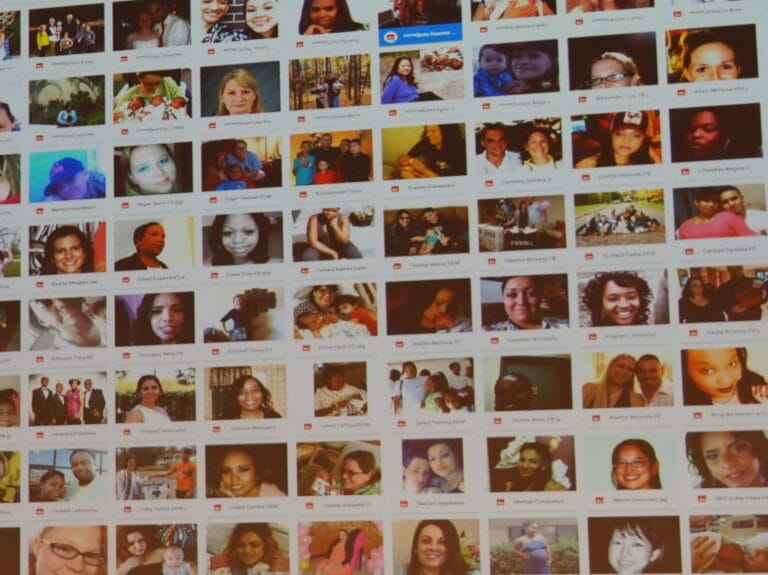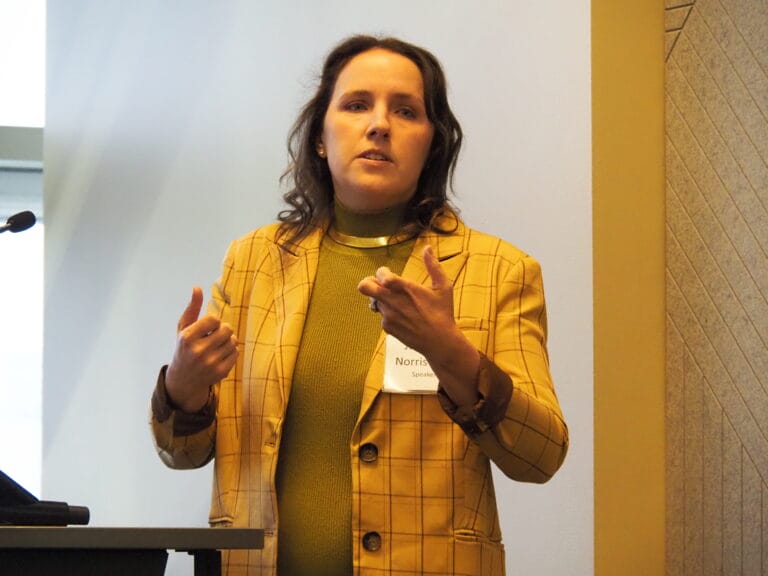Navigate Maternity founder and CEO Ariana McGee speaks at a conference focused on maternal mortality on Thursday, Oct. 19. (Leslie Bonilla Muñiz/Indiana Capital Chronicle).
Indiana has one of the highest rates of death for pregnant and postpartum women
Ariana McGee was on her fourth pregnancy in as many years.
McGee’s obstetrician-gynecologist (OB-GYN) cautioned that the scar tissue from her three previous cesarean sections put her at high risk for serious complications: feel any contractions, head to the hospital. But when she arrived — in labor, a week and a half shy of her scheduled c-section — the doctor told her to go home. McGee and her mother protested.
“(The doctor) looked at me once more, and she looked at my mom. … She’s like, ‘First c-section, fourth c-section. They’re all the same,” McGee said. “… If you don’t go home, I will call security.”
McGee’s attorney mother jumped to her defense, and another pair of doctors took over. The team found a massive rupture: a uterine window so large they could “see the baby’s hair,” McGee said.
If she’d gone home as the first doctor directed, she said, “I would’ve lost my child. I would’ve lost my life. And my husband would have been a widow, and my (other) children would have been motherless.”

McGee spoke on Thursday at the annual State of Women in Indiana conference hosted by nonprofit Women4Change. This year’s event focused on maternal mortality.
McGee has since founded a technology company that aims to improve pregnant patients’ outcomes, but some Hoosier women don’t get that chance: Indiana had the nation’s third-highest mortality rate in 2022.
National crisis rages in Indiana
McGee’s experience wasn’t uncommon.
In a years-long project investigating maternal mortality in the United States, former ProPublica reporter Nina Martin and others interviewed 5,000 people.
Women frequently told the reporters that medical professionals didn’t believe them when they said something was wrong, and that self-advocacy often “made things worse,” Martin said. That problem was more pronounced for Black women, she said.
“And then, when (birth) was over, nobody apologized. It was just like, ‘You’re saved. You’re good. Go move on with your life,’” Martin observed. The team also found “that the impacts in terms of depression, anxiety, (post-traumatic stress disorder), were very long-lasting.”
The “Lost Mothers” project prompted some hospital systems to improve their protocols around potentially lethal developments like preeclampsia and hemorrhages, Martin recounted. The U.S. Centers for Disease Control worked with states to set up maternal mortality review committees; Indiana’s dates back to 2018.
Then, the pandemic hit — and the rate of death increased sharply, particularly for Black women.
The Indiana Maternal Mortality Review Committee’s 2022 annual report — which covers 2020 deaths — found 117 pregnancy-associated deaths per 100,000 live births that year. The rate translates to 92 deaths — a full 79% of which were deemed preventable.
Pregnancy-associated deaths include the death of any woman during pregnancy or one year after childbirth irrespective of cause. Most died after childbirth, with substance abuse disorder contributing to 43% of deaths. Overdoses were by far the leading cause of death, accounting for 30% of fatalities.

It can be challenging for Hoosier parents to seek help, said Mission: Maternity founder Jennifer Norris-Hale.
Norris-Hale also experienced a traumatic birth: she went to the emergency room with chest pain at 40 weeks pregnant, and was nearly discharged until doctors tested her blood levels. She was diagnosed with preeclampsia and immediately induced.
Afterward, she fell into a postpartum depression. It took her two years to “fix things,” she told the Capital Chronicle.
Medication helped. So did a therapist’s suggestion to join a play group with her young son.
Norris-Hale emphasized the importance of caring for and focusing on mothers.
“What if we held the mother first?” she read aloud in a poem credited to maternal wellness website Dear Sunday. “What if we held her so much that she could breathe out those worries? … What if we did that before we held the baby. And what if, in all that space, she felt ready for us to hold the baby because she felt held herself?”
But mothers face a myriad of barriers in accessing similar resources, she said: education, awareness, transportation, child care, stigma and more.
Even within the health care system, providers may not believe in postpartum mental health disorders or may not know where to refer patients that screen positive for a condition, she added. Legislative barriers exist as well, like paid family leave.
This article originally appeared on Indiana Capital Chronicle.






